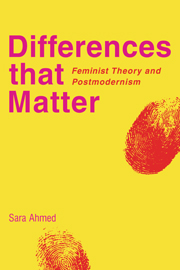Conclusion: Events that move us
Published online by Cambridge University Press: 22 September 2009
Summary
I have read enough conclusions about the impossibility of making conclusions to want, in some sense, to make one. In concluding, in coming to an end, I want to return. I want to return to the question of the status of the anecdote that I raised in my opening comments in chapter 6. I want to return to the status of the events that have been named as such in my narrative. Such events are events that have moved me, that have compelled me to write. But what is the relation between the movement of the event – the impossible meeting of work and life – and the movement initiated by the event – where, within my narrative, it no longer stays still? What are the implications of this movement for my argument, for the very question of differences that matter?
Differences matter, this much is clear. I have argued that the differences between postmodernism and feminism are ones that matter. But, as I acknowledged in my introduction, postmodernism does not simply exist as such, but is constructed through the very discourses which write, read and see its existence. So, I have been cautious. I have entered texts very closely. I have moved about in them. Each text has been engaged with in its difference or particularity. Despite the closeness of the difference within, I have still kept a critical distance: I have moved from the (difference) ‘within’ to the (difference) ‘between’.
- Type
- Chapter
- Information
- Differences that MatterFeminist Theory and Postmodernism, pp. 191 - 197Publisher: Cambridge University PressPrint publication year: 1998



